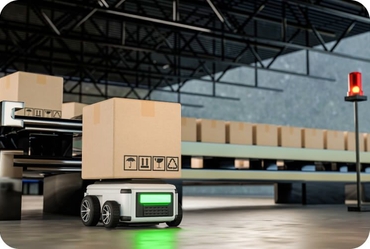
What Trends Will Shape Cross-Border Logistics in the Next Decade?
Cross-border logistics is at the forefront of global trade, and the next decade is expected to bring transformative changes. Advances in technology, shifting trade policies, and growing environmental concerns are shaping the future of the industry. Here are the key trends set to influence cross-border logistics in the coming years.
1. Increased Automation and AI Integration
Automation and artificial intelligence (AI) will continue to revolutionize logistics processes, offering:
- Predictive Analytics: Forecasting demand and optimizing inventory levels.
- Automated Warehousing: Using robotics for faster and more accurate order fulfillment.
- AI-Powered Route Optimization: Reducing transit times and fuel consumption.
These technologies enhance efficiency, reduce costs, and improve decision-making across supply chains.
2. Expansion of E-Commerce and Direct-to-Consumer (DTC) Models
The growth of e-commerce and DTC businesses is reshaping cross-border logistics. Key impacts include:
- Increased Parcel Volumes: Higher demand for fast and reliable delivery services.
- Localized Fulfillment Centers: Setting up warehouses closer to key markets to reduce delivery times.
- Cross-Border Payment Solutions: Streamlining international transactions for seamless customer experiences.
Companies must adapt their logistics networks to meet the expectations of global online shoppers.
3. Focus on Sustainability and Green Logistics
Environmental concerns are driving the adoption of sustainable practices in logistics. Trends include:
- Eco-Friendly Transport Options: Using electric vehicles and alternative fuels.
- Sustainable Packaging: Reducing waste with biodegradable or recyclable materials.
- Carbon Offsetting Programs: Compensating for emissions through reforestation or renewable energy projects.
Sustainability initiatives align with consumer expectations and regulatory requirements.
4. Digital Transformation of Customs Processes
Digitalization is simplifying customs procedures and reducing delays. Developments include:
- Electronic Documentation: Replacing paper-based processes with digital systems.
- Blockchain for Transparency: Ensuring secure and tamper-proof trade documentation.
- Automated Duty Calculations: Streamlining tax and tariff compliance.
These advancements reduce bottlenecks and improve cross-border trade efficiency.
5. Adoption of Advanced Tracking Technologies
Real-time tracking systems are becoming a standard in cross-border logistics. Benefits include:
- IoT-Enabled Devices: Monitoring shipment location, condition, and temperature.
- Customer Transparency: Providing real-time updates to enhance the delivery experience.
- Risk Mitigation: Identifying potential disruptions early to minimize losses.
Tracking technologies improve accountability and customer satisfaction.
6. Growth of Regional Trade Agreements
Trade agreements will continue to shape cross-border logistics by:
- Reducing Tariffs: Lowering costs for businesses operating across borders.
- Harmonizing Regulations: Simplifying compliance with standardized rules.
- Encouraging Regional Collaboration: Boosting trade within specific zones, such as the African Continental Free Trade Area (AfCFTA).
Understanding these agreements will be vital for businesses navigating global markets.
7. Rise of Digital Freight Marketplaces
Online platforms connecting shippers and carriers are transforming freight management. Key features include:
- Dynamic Pricing: Adjusting rates based on real-time demand and capacity.
- Instant Bookings: Simplifying the process of finding reliable carriers.
- Performance Analytics: Offering insights to improve logistics strategies.
Digital freight marketplaces increase efficiency and reduce inefficiencies in traditional systems.
8. Greater Emphasis on Resilience and Flexibility
Recent global disruptions have highlighted the need for resilient supply chains. Strategies include:
- Diversified Suppliers: Reducing dependency on a single source.
- Nearshoring: Relocating production closer to target markets to mitigate risks.
- Scenario Planning: Preparing for potential disruptions with contingency plans.
Resilience ensures continuity in cross-border operations despite unforeseen challenges.
9. Localization of Manufacturing and Warehousing
To reduce shipping times and costs, companies are investing in localized infrastructure. Trends include:
- Regional Warehouses: Improving delivery speed to key markets.
- Micro-Fulfillment Centers: Catering to urban areas with faster last-mile delivery.
- Distributed Manufacturing: Leveraging 3D printing for localized production.
Localization optimizes cross-border logistics for efficiency and speed.
10. Emphasis on Data-Driven Decision Making
Big data analytics is empowering businesses to make informed decisions. Key applications include:
- Customer Insights: Understanding purchasing behavior to improve service offerings.
- Operational Efficiency: Identifying inefficiencies and optimizing workflows.
- Risk Assessment: Predicting and mitigating supply chain disruptions.
Data-driven strategies will be central to managing the complexities of cross-border logistics.
Conclusion
The next decade will bring significant advancements to cross-border logistics, driven by technology, sustainability, and evolving trade dynamics. Businesses that embrace these trends will be better positioned to thrive in a competitive global market. By adopting innovations such as automation, green logistics, and advanced tracking technologies, companies can achieve greater efficiency and resilience in their operations. To explore tailored logistics solutions, visit Boxit4me and discover how they simplify global shipping for businesses and individuals alike.
- 1. Increased Automation and AI Integration
- 2. Expansion of E-Commerce and Direct-to-Consumer (DTC) Models
- 3. Focus on Sustainability and Green Logistics
- 4. Digital Transformation of Customs Processes
- 5. Adoption of Advanced Tracking Technologies
- 6. Growth of Regional Trade Agreements
- 7. Rise of Digital Freight Marketplaces
- 8. Greater Emphasis on Resilience and Flexibility
- 9. Localization of Manufacturing and Warehousing
- 10. Emphasis on Data-Driven Decision Making
- 11. Conclusion
Related Articles

What Are the Emerging Technologies for Cost-Efficient Global Shipping?

